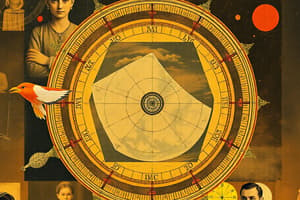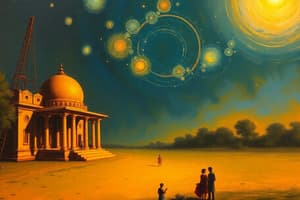Podcast
Questions and Answers
Who is credited with first proposing the heliocentric theory that the Earth revolves around the Sun?
Who is credited with first proposing the heliocentric theory that the Earth revolves around the Sun?
- Archimedes
- Aryabhatta (correct)
- Euclid
- Pythagoras
Which mathematician from ancient India was the first person to create a symbol for zero?
Which mathematician from ancient India was the first person to create a symbol for zero?
- Varahamihira
- Brahmagupta
- Aryabhatta (correct)
- Bhaskara II
What did Aryabhatta contribute to the field of astronomy?
What did Aryabhatta contribute to the field of astronomy?
- Inventing the telescope
- Proposing the geocentric theory
- Predicting solar and lunar eclipses (correct)
- Predicting the distance between Mars and Jupiter
What major mathematical concept did ancient India introduce to the world?
What major mathematical concept did ancient India introduce to the world?
How did the integration of zero into the place-value system transform mathematics?
How did the integration of zero into the place-value system transform mathematics?
What fundamental aspect of mathematics did Aryabhatta's work significantly impact?
What fundamental aspect of mathematics did Aryabhatta's work significantly impact?
Which ancient Indian mathematician developed the chakravala method for solving indeterminate quadratic equations?
Which ancient Indian mathematician developed the chakravala method for solving indeterminate quadratic equations?
Who generalized the chakravala method for a wider range of equations?
Who generalized the chakravala method for a wider range of equations?
In which treatise did Bhaskara II refine the chakravala method?
In which treatise did Bhaskara II refine the chakravala method?
Who proposed the atomic theory centuries before John Dalton?
Who proposed the atomic theory centuries before John Dalton?
According to Kanad's atomic theory, what are the two states of anu (atoms)?
According to Kanad's atomic theory, what are the two states of anu (atoms)?
What did Kanad propose about the combination of atoms of the same substance?
What did Kanad propose about the combination of atoms of the same substance?
What was the name given to the number system adopted by the Arabs, which was originally devised by Indians?
What was the name given to the number system adopted by the Arabs, which was originally devised by Indians?
Which Indian mathematician is credited with first calculating the value of pi?
Which Indian mathematician is credited with first calculating the value of pi?
Who is credited with first introducing the Fibonacci sequence to Western European mathematics?
Who is credited with first introducing the Fibonacci sequence to Western European mathematics?
Which ancient Indian scholar is credited with first describing the binary number system?
Which ancient Indian scholar is credited with first describing the binary number system?
Which Indian mathematician is credited with developing the chakravala method for solving indeterminate quadratic equations?
Which Indian mathematician is credited with developing the chakravala method for solving indeterminate quadratic equations?
Which Indian mathematician is credited with explaining the concept of the Pythagorean Theorem?
Which Indian mathematician is credited with explaining the concept of the Pythagorean Theorem?
Flashcards
Aryabhatta's contribution
Aryabhatta's contribution
Aryabhatta presented the heliocentric theory, predicted eclipses, and calculated Earth-Moon distance in his book, Aryabhatiya.
Concept of Zero
Concept of Zero
Aryabhatta's invention of zero enabled the decimal system and mathematical operations.
Decimal System
Decimal System
A number system using 10 symbols (0-9) with positional values for calculations.
Chakravala Method
Chakravala Method
A cyclic algorithm for solving indeterminate quadratic equations, like Pell's equation.
Signup and view all the flashcards
Atomic Theory (India)
Atomic Theory (India)
Kanad proposed the concept of atoms (anu) and their combinations (dvyanuka, tryanuka).
Signup and view all the flashcards
Value of Pi (India)
Value of Pi (India)
Budhayana calculated pi and explained the Pythagorean theorem.
Signup and view all the flashcards
Indian Numerals
Indian Numerals
The symbols for 1-9 were developed in India, later adopted as Arabic numerals.
Signup and view all the flashcards
Fibonacci Sequence (India)
Fibonacci Sequence (India)
Pingala first described the Fibonacci sequence, later developed by other mathematicians.
Signup and view all the flashcards
Binary Numbers (India)
Binary Numbers (India)
Pingala described binary numbers (0s and 1s), fundamental to computer science.
Signup and view all the flashcardsStudy Notes
Ancient Indian Mathematicians and Their Contributions
- Aryabhatta's book, Aryabhatiya, represented the pinnacle of astronomical knowledge at the time, correctly propounding the heliocentric theory and making predictions about solar and lunar eclipses, day duration, and Earth-Moon distance.
Mathematics
- The concept of zero, invented by Aryabhatta, enabled mathematical operations like addition and subtraction, and facilitated writing large numbers using only 10 symbols in the decimal system.
The Decimal System
- The decimal system, developed in India, expresses all numbers using 10 symbols, with each symbol having a positional value and an absolute value, making arithmetic calculations faster and easier.
Chakravala Methods of Algorithms
- The chakravala method, developed by Brahmagupta, is a cyclic algorithm to solve indeterminate quadratic equations, including the Pell's equation.
- Jayadeva generalized this method for a wider range of equations, and Bhāskara II further refined it in his Bijaganita treatise.
Atomic Theory
- Kanad, an ancient Indian scientist, devised the atomic theory, speculating the existence of anu (small indestructible particles) and their states of rest and motion.
- Kanad also described the combination of atoms to produce dvyanuka (diatomic molecules) and tryanuka (triatomic molecules).
The Value of Pi
- The Indian mathematician Budhayana first calculated the value of pi and explained the concept of the Pythagorean Theorem.
Numeral Notations
- Indians developed a system of different symbols for every number from one to nine, which was adopted by the Arabs as hind numerals and later by the Western world as Arabic numerals.
Fibonacci Sequence
- The Fibonacci sequence, known as mātrāmeru, was first described in Indian mathematics by Pingala, and later developed by mathematicians Virahanka, Gopala, and Hemacandra.
Binary Numbers
- The binary number system, first described by the Vedic scholar Pingala, is the basic language of computer programs, using combinations of 0 and 1 to form bits and bytes.
Studying That Suits You
Use AI to generate personalized quizzes and flashcards to suit your learning preferences.




